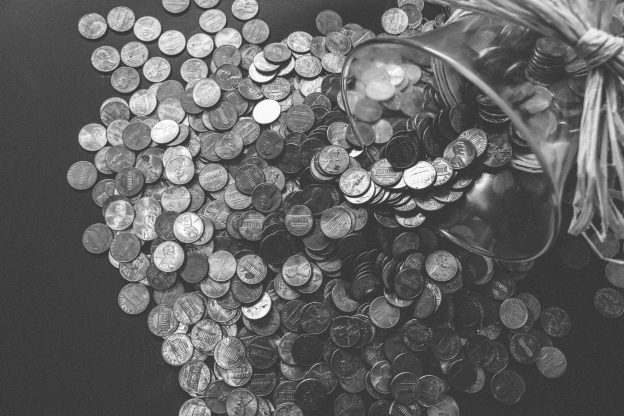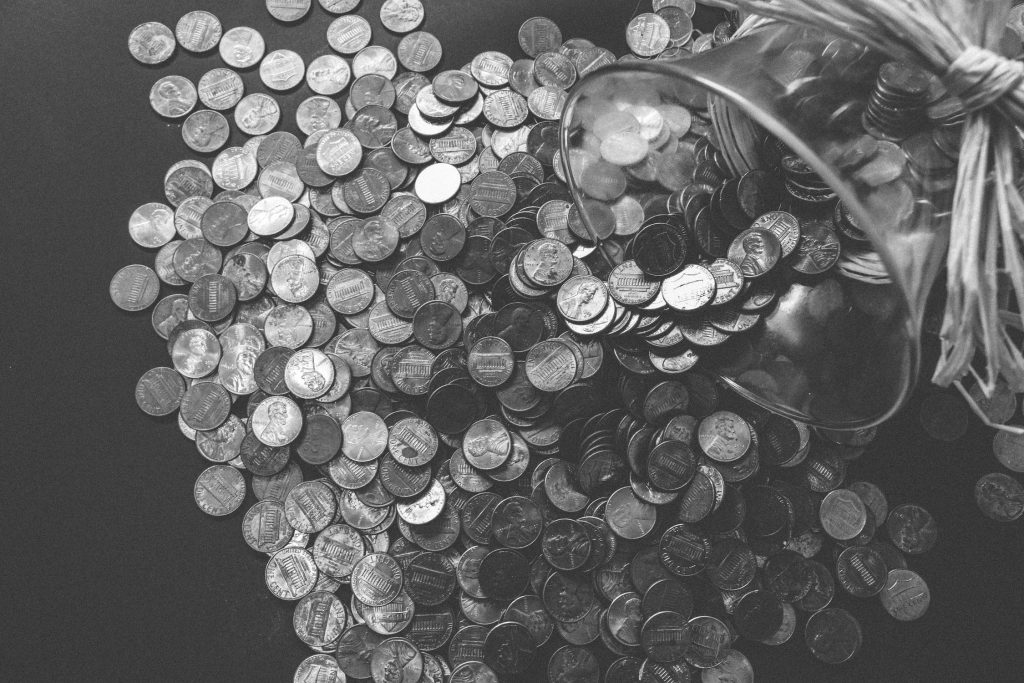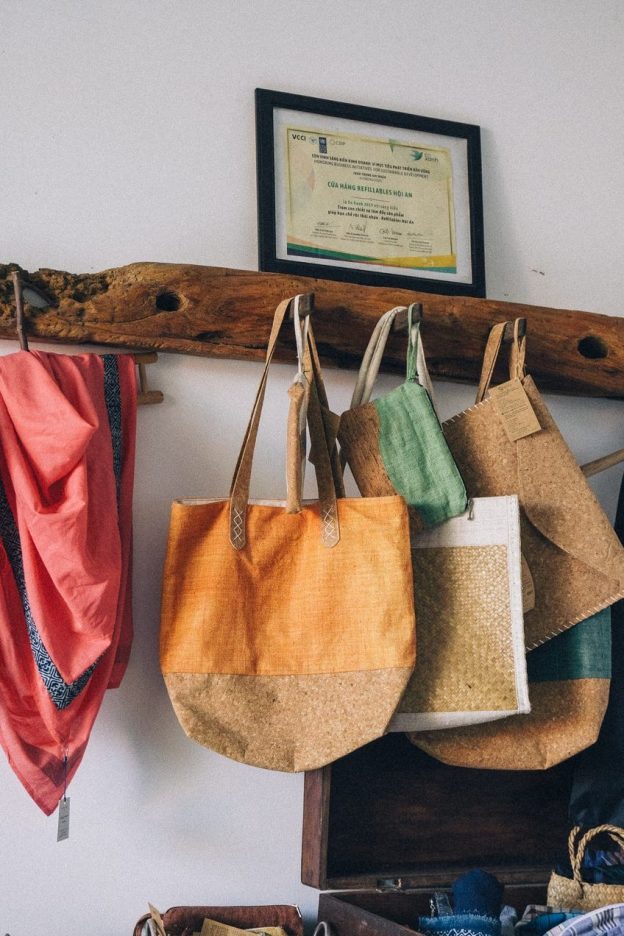The Frequency Illusion is when a particular word, idea or number seems to keep recurring in your life. I’m sure it’s happened to you before. Imagine you make a new acquaintance with an obscure name (Marmaduke for example) and despite never having met a Marmaduke before, in the following week you come across three or four other Marmadukes – they are on TV, on the Radio, your niece names her goldfish Marmaduke, you go past a cafe named Marmeduke’s. You can’t get away from Marmaduke.

This week I’ve been experiencing Frequency Illusion in relation to lobsters. I have no particular interest in lobsters. I think I’ve eaten lobster a grand total of once. But this week I can’t get away from them.
It began at the start of the week when I read an unusually compelling article entitled Consider The Lobster by David Foster Wallace. You may have read it before – it’s won awards. It has nothing to do with personal finance. It is, as the name suggests, about lobsters. Since reading it I’ve been seeing lobsters everywhere. I listened to a narrative-style podcast in which Millenial Revolution’s FIRECracker uses lobsters as recurring example of a luxury she enjoys spending money on. A rerun of Friends showed the episode where Phoebe talks about lobsters mating for life (“She’s your lobster!”). I notice that this month Converse and I are on the verge of reaching our $100,000 investment portfolio goal which I recorded in my diary ages ago should be celebrated with steak… and lobster.
Frequency Illusion suggests that I’m not really being surrounded by all things lobster any more than usual. I’m just noticing it more because of the article I read. Consider The Lobster has really stayed with me.
The article isn’t about finances at all. It starts seemingly as a piece of travel writing, describing the Maine Lobster Festival, but, like a slowly boiling lobster, the article gradually heats up into a discussion of morals, encouraging the reader to question if there really is an ethical way to eat a meal which typically involves boiling a struggling creature to death. The part of the article that really stayed with me is in the second to last paragraph, which in a philosophical turn, deals with the idea that because people like eating lobster, they aren’t willing to think about if it’s the right thing to do:
“Given the (possible) moral status and (very possible) physical suffering of the animals involved, what ethical convictions do gourmets evolve that allow them not just to eat but to savor and enjoy flesh-based viands … what makes it feel okay, inside, to dismiss the whole issue out of hand? That is, is their refusal to think about any of this the product of actual thought, or is it just that they don’t want to think about it? Do they ever think about their reluctance to think about it?” Consider the Lobster: 2000s Archive : gourmet.com
The article concludes that many people will refuse to ‘consider the lobster’ because it’s uncomfortable for them to do so. They are reluctant to think about it. They don’t want to risk being faced with the unpleasant reality that their immediate enjoyment comes at an unacceptable cost.
And that, Dear Reader, is what lobsters have in common with personal finances.
Though Converse and I are in the early stages of our FIRE journey, we feel like we are making good headway. I feel a bit like we’ve struck upon a secret key to early retirement and I want to shout it from the roof tops. We’ve both tentatively tried to share this good news with other people we work with. We’ve gently explained our goal to save at least 50% of our earnings. We’ve tried to explain, with as little condescension and judgment as possible why it might be a good idea for other people to reduce their spending and increase their savings. Sadly, though some are politely interested, most are openly dismissive.
Despite our colleagues earning the same high salaries as us we can see massive differences in our lifestyles. It’s not that we don’t enjoy the finer (and more expensive) things in life; it’s that we enjoy them in moderation. When we explain that we don’t plan to take any staycations this year, or we won’t be going to that new bar where a soda costs $10 USD, or we won’t be attending a birthday party on a catered yacht for $125 USD per person – these are all actual conversations which have taken place in the last month – we are met with a range of negative reactions including, pity, confusion and sometimes scorn and derision. It’s sad that we are missing out on staycations. It’s confusing that we can’t afford to go to an expensive bar – surely we get paid enough? It’s ridiculous that we are so stingy that we are depriving ourselves of a day on a yacht.
The reason we are entirely comfortable declining these experiences is that we’ve considered it and come to the conclusion that the immediate enjoyment of these luxuries comes at the unacceptable cost of financial insecurity. This wasn’t easy or instantaneous. It wasn’t a quick decision and at times we’ve faced some uncomfortable truths about ourselves and our spending. It’s not easy to admit to yourself how manipulated you’ve been by the ‘keeping up with the Jones’s’ mentality, or how often you’ve used spending to compensate for laziness or a lack of motivation. But having done so, we now feel much better about our choices. I’m not suggesting every choice we’ve made is going to turn out to be the best decision, but at least we can say they were choices made with intentionality. We are now being thoughtful and intentional in our personal finances. Maybe we are still making mistakes, in fact, I’m sure we are, but at least in the future, when we look back at what we got wrong, we’ll know the right intentions were there.
Although at times it was uncomfortable, we’ve considered our personal finances, something which we’ve discovered many people are reluctant to do. We’d like to encourage the people we care about to do the same, and maybe in time we will. Perhaps when we’ve been at this FIRE thing a bit longer and have more tangible evidence of how it’s working for us we’ll be able to put forward a more convincing argument for considering your own personal finances.
Although I’m not sure where I stand on the ethics of eating lobster, as I mentioned it’s not something I’ve ever really eaten, so committing to not eat lobster in the future is no sacrifice. Personal finance however, is something which affects all of us everyday, whether we choose to think about it or not. I hope that in the future I continue to be as intentional and honest with myself about my personal finances as I have been recently. One thing I am sure of is that as Converse and I reach our $100,000 investment milestone, we may be celebrating with steak, but we will certainly not be having lobster.
Film Review: Office Space
If you look at lists of films to watch for people who want to quit their jobs I guarantee Office Space will be on almost every list. It’s the late 90’s comedy classic about men rebelling against a mindless corporate career existence.
In many ways, when you begin watching, this film feels like it has all the hallmarks of a financial independence anthem. There is that cold inefficiency of the corporate world, in which characters feel powerless and under constant scrutiny from their bosses. There is the empty small talk as well as the barrage of weekday related quips as the main character has his feelings of frustration at not being heard reduced to “a case of the Mondays”. Above all there is the message that even if you think that turning up on time, doing your job and going along with all the banalities of corporate life, your company doesn’t value you as an individual at all and would easily replace you.
As I watched this film it occurred to me that financial independence was the solution to each of these problems. It’s hard to feel powerless, for example, if you can walk away from your job at any time. Your unlikely to measure out you time in relation to where the weekend falls, waiting for your two days of freedom if you’re already financially free to only work when and where you want to. You’ll feel less inclined to measure your value by how much your employer needs you if you don’t need them.
At this point in the film, the main characters hatch out a plan to steal from the big corporation and ultimately achieve financial independence.
**Spoilers below**
Once the protagonist (Ron Livingston) has decided he doesn’t care about his job anymore and refuses to say what is expected of him and go along with all the social ‘niceties’ of office life, he finds that rather than be criticised for his attitude he is promoted for it. His honesty about his lack of motivation is mistaken for potential and his refusal conform to corporate expectations (like acting subservient to his boss or dressing in an ‘office appropriate’ way) are interpreted as dynamic and creative. He is quickly labeled as “leadership material”. This makes me wonder how many people as stuck in stagnant career paths, under-appreciated by their employer because they are worried that by not ‘playing the game’ could lead to disciplinary action rather than positive recognition. Financial independence is the only way to find out.
Though this film is a work of fiction and comedy, and certainly not meant to be taken too seriously, there are documented examples of this happening amongst FIRE bloggers. Mad Fientist has written and spoken on podcasts about several occasions where he intended to quit his job but was instead negotiated into a role which put his needs first, giving him pay increases and allowing him to work remotely so that he could travel internationally.
Despite this film seeming to herald a lot of the ideas and values that people aiming for financial independence share, I found the ending of this film unsatisfying.
Ultimately the characters regret their unlawful behavior (which is fair) but the moral of the story isn’t that we should all find financial independence and quit our jobs, but rather that we should be more open to quitting jobs we don’t like and finding new ones. Of the four main characters, two move to almost identical jobs in another company, the main character finds working for an outdoor construction crew makes him happier than working in a white-collar job ever did, and Jenifer Anniston’s waitress character moves literally to the restaurant next door which has a uniform she prefers.
While this presents a seemingly happy ending for the characters, I can’t help but feel let down that with the exception of one character changing careers, all of the characters are very much back where they started by the end of the film.
The one exception is Stephen Root’s character, Milton. Milton has been the underdog for the whole film, mistreated and exploited. He is a hilarious character and provides some of the best comic relief. Throughout the film Milton is a minor character who constantly tells people that the next act of mistreatment will be the last straw and he will quit, but of course it never is and he never does. Milton, through a stroke of luck, ends up with the stolen money and in the final scene we see him on a tropical beach sipping cocktails from coconuts. Though the irony at the end is that he still seems dissatisfied and is complaining about the cocktails as the final movie scene fades out.
The final scene of the movie is a trope that many people lean on when I tell them about my plans for early retirement – they tend to split into two factions. The “what would you do if retired – I’d get bored without work” faction, who have always struck me as lacking in imagination, and the “I’d love to retire early, I’d spend all day on a beach drinking mai tai’s!” camp who are only slightly more imaginative. In both cases they are missing the point – retiring early isn’t about doing nothing, it’s about doing whatever you want. When people imagine relaxing on a beach sipping rum from a coconut, they are imagining a holiday, not financial freedom. Spending time on the beach doing nothing is a great reprieve from work when you know you have to go back to the office in a week or two, but it isn’t a long-term plan. Maybe the first “I’d get bored” camp have a more realistic idea; doing nothing can be boring. But retirement doesn’t have to be doing nothing, in fact, it allows us to look for purpose in our lives and consider how we can find meaning and value in our time outside of employment. Overall, I don’t judge either group too harshly (although it has been frustrating to hear these two sentiments parroted back to me whenever I mention retiring before the age of 40), and I’ve been guilty of thinking along the same lines prior to becoming part of the FIRE movement and realizing that financial independence could be a genuine reality.
The ending of Office Space reminded me that for the vast majority of us, we’ve been raised with the expectation that we will go to school, graduate, get a job which pays us in relation to our level of education, live a lifestyle in line with our income and retire at 65. Coming around to the idea that we don’t need to follow this very linear path is something that’s taken me some time. While Office Space is a great, light-hearted film for people who are sick of their jobs, for me it falls just shy of getting to the point. I enjoyed the film and would recommend it, but with the caveat that while the ending wraps up the story very neatly, for a FI’er, it’s going to fall short.
Office Space is a fun comedy and will appeal to those on the financial independent trail, especially if you’ve suffered from an experience working for a big corporation or a boss with zero interest in your personal well-being, but in the end, it’s back to work for all of the main characters.

Work Hard, Play Hard.
There was a time when the ‘work hard, play hard’ mentality seem to be this exciting, alluring concept which spoke to me of big pay cheques, exhilarating extra-curricular pursuits and a wide social circle.

Those days are firmly gone.
Now, when I hear someone utter the phrase ‘work hard, play hard’ I inwardly (and sometimes outwardly) cringe. Now it speaks to me of slogging away at an unrelenting, unyielding workload and being so exhausted at the end of the working week that the only way you can let off steam is to get wasted.
I believe that more often than not, that “work hard, play hard” is thinly veiled euphemism for working yourself to the point of exhaustion at an unrewarding job and then drinking the night away in an effort to feel like you’ve done something with your free time.
The problem is, drinking as an activity, is inherently boring. I don’t want to sound puritanical here. I don’t have anything against having a drink; I’m sipping on a rum and coke as I write this. But it isn’t going to be my activity for the evening. I have other interests and hobbies I pursue in my free time. The problem with many big corporate jobs is they are so draining many people don’t feel like they have the time, energy or motivation to do anything more interesting than go out for a drink. The problem is, it isn’t particularly fulfilling or interesting. I’m sure you’ve heard people, either friends or colleagues talk about a night out they’ve had – there are usually a lot of vagaries and a group bigging-up of the night’s events – it was crazy! Absolutely mental! The funniest thing happened – it was hilarious – you should have been there! But it all sounds very similar to every other night out you’ve ever had.
Corporations encourage the ‘work hard, play hard’ mentality. It’s very much in their interest for their employees to buy into this way of thinking. Work hard. Put everything you’ve got into the company. Everyone else is working hard, it’s our office culture, so you should too. Play hard. Go for drinks with your colleagues. You’ve earned it. There’s no need for a social circle outside of the office when your work buddies are also your drinking buddies. Go for after work drinks. It’s inevitable you’ll talk about work while you’re out. After all, what else do you all have in common? Maybe some work issue will get sorted out over drinks – that’s very productive of you. Maybe there will be some healthy competition – now you’ll feel the need to work even harder.
My work can be oddly seasonal, going through frantically busy periods (usually in winter and spring) and then I can have long periods of reduced work load (always in summer). This means I can feel very clearly the difference work makes to my free time. When I’m most tired going out for food and drinks is most appealing. I have no energy to cook for myself and I’m not in the right headspace to plan activities. However, when the work-pressure fades away the quality of my free time dramatically improves. I swim, I hike, I get involved in team sports, I plan places to visit, I read, I write, I volunteer. I do interesting things with my time that build skills and persue interests. I set myself ambitious goals (and sometimes I achieve them). When I’m asked what I did at the weekend my answers are consistently more interesting that if I’d been on a crazy night out, which lets face it, in the cold light of day seems dramatically less crazy.
Maybe you disagree. Maybe you’re reading this thinking that you work hard in a rewarding environment and play hard at a varied and interesting range of activities. But if so I think you may need to find a new catchphrase. Because “work hard, play hard” has been taken by the corporate environment and I don’t think they are planning on giving it back anytime soon.

The Importance Of Doing It Yourself
The basic premise of achieving FIRE always comes down to spending less than you earn. The bigger gap you can put between your income and your outgoings and the quicker you can achieve FIRE. There are two ways of making the gap bigger – earn more or spend less. Ideally, do both!

The importance of doing things yourself to reduce costs was one I’d read about on FIRE blogs but I didn’t really think it was something that applied to me. I’m not particularly handy; I’m lucky that Converse is a great cook, because I am not; I don’t have any artistic talents. As a rule I don’t make things. I wasn’t really convinced that there was anything I could do myself that was going to save us any money. I thought that ‘doing it yourself’ to reduce costs wasn’t something I was going to be able to benefit from. But here I am, only five months into FIRE and I’m beginning to realise that while I’m not about to whittle my own cutlery, sew my own clothes or paint a mural on my bedroom wall, there are many small things that I am now doing for myself.
I’ve stopped almost all kinds of deliveries. From takeout to supermarket shopping to getting things through the post, if there’s an option to come and pick it up myself and skip the delivery cost, I’m doing that. When a colleague had a birthday at work recently, I borrowed a cake tin and made a cake myself. It turns out you don’t need to be a great baker to make a vanilla sponge cake. Although I can walk home from work, it takes an hour and in summer the heat is punishing, but what I did discover is that if I walk 15 minutes to the bus stop which is two stops farther down the line, the bus fare drops by almost half. When my friends want to do something after work, I can crack open a can of coca cola or lager as well as any bar tender, and for about an tenth of the price.
There are probably a handful of other small, boring but effective ways I’ve found of lowering costs by doing things myself. What I’m finding is I don’t need to be particularly, creative, crafty, handy or skilled. Most of the time, I just need to be willing to put a little more effort in.

5 Small Ways FIRE Helps Reduce Our Environmental Impact
- Less Plastic Packaging
We avoid shopping in supermarkets and shop in markets instead. In Asia, supermarkets are almost always more expensive than the local wet market. If you haven’t spent much time in Asia, you might not have heard of wet markets, or if you have, you might be thinking of the infamous Wuhan market; epicentre of Covid-19. Really, wet markets are similar to farmers’ markets in the west. Fruit, veg, noodles, and other foods are sold from market stalls. There’s no excess plastic packaging, in comparison to the supermarkets which often triple wrap individual fruits and veg in layers of plastic. At the market I can bring my own bags and avoid any packaging waste completely.
2. Reduced Transport Costs
The cheaper transport costs always seem to align with the most environmentally friendly options. The worst option would be owning a car (or owning a car each!) but we are entirely car-free. Next are taxis, which we use occasionally, usually only when there’s an awkward location to get to. Public transport is the next best option, it’s cheap and most buses in our city run on fuels that are more environmentally friendly. Finally, the very best option: your own two legs. We are lucky that we both live withing walking distance of work. We almost never walk to work (for a variety of reasons that I won’t get into) but walking home is something we do fairly often.
3. Only Buying What We Need
We recently had a big clear out when we moved to a smaller apartment. This really drove home for is how much we had spent money on that we really didn’t need. We are now both much more focused on a) only buying things we really need and which will improve our lives, and b) buying things that are good quality and will last. This way we will contribute less waste and reduce our reliance on mass produced crap that factories are churning out everyday.
4. Repairing and Reusing
Similarly, we are aiming to hang on to what we do buy. I’m seeing a lot of connections between minimalism and frugality. Whereas before we might have thrown out something that was looking a bit tired or worn out. Instead, we are now trying to make things last. We are aiming to repair (or sometimes just thoroughly clean) things that we might previously thrown away. I like the idea which I saw echoed across several minimalism blogs, of ‘shopping at home’. This encourages us to check that we don’t already have something at home before buying a new item.
5. Fewer Takeouts and Food Delivery
Finally, we’ve massively reduced how many takeaways we order. We are still having takeaway food about once a week (maybe this amount will continue to go down as we become more frugal), but we are avoiding having it delivered to us, choosing instead to walk and pick up our food. The less we takeaway, the less packaging waste we have, and if we pick it up ourselves we save money on delivery costs as well as reducing the emissions if someone on a motorbike were to deliver it to us.


Are We On The Path To FIRE?
“Are we part of the FIRE movement yet? How will we know when we are?”
FIRE might have been something that snuck up on us. We’ve never been very good at recording dates and memorable occasions. Beyond birthdays and Christmas, we don’t have any specific anniversaries we celebrate, so it’s unsurprising that we’ve lost track of when exactly we committed to the FIRE movement.

It’s currently May 2021 as I write this, but looking back we really began our journey towards FIRE in January. We’d made a few positive steps towards FIRE in the year before but these weren’t conscious choices towards financial independence. These were really just taking control of our finances and starting to look towards the long term. Even our commitment to FIRE was propelled and accelerated by circumstances beyond our control, firstly the Covid 19 Pandemic, during which we were barely leaving our apartment and therefore had the time to research what we should do with our money which was beginning to accumulate now that restaurants, bars and holidays were off the table. Then, on Christmas Eve 2020, our landlord announced that the apartment which we’d been renting for five years was being sold and we would have to find somewhere else to live.
At the time, being forced to leave ‘our’ apartment was an unexpected upheaval and we found it incredibly stressful, but in hindsight it was one of the best things that could have happened to us at that time.
We’d just spent a year learning about the importance of taking control of your finances, living frugally and intentionally, focusing on what really mattered to us and we were beginning to toy with working out our FIRE number. It was with all of this in mind that we began looking for a new apartment. This one big change led us to make a hundred more tiny choices and changes to how we live. The new apartment was smaller – we had to seriously consider which of our possessions increased our quality of life and was worth keeping. We had to face up to how many of the things we’d spent money on over the years could be thrown away without being missed at all. We reconsidered our commute to work and calculated how much it was costing us. We also reconsidered our many shopping habits, what we were buying from where and how often we were making good choices rather than just going with what felt convenient.
It was as we were making these many small changes that we began tracking our spending. It felt like a fresh start and so getting into a new habit of recording our every spend was something we wove into our new lifestyle. Despite being sure we knew where our money was going and what our largest costs were, we were surprised by what we found. In some ways it was great to find that the things I was sure were costing us the most money were, in fact, not. But then were was the money going each month? We had to track all of our monthly outgoings to find the insidious costs that were sneaking out of our bank accounts.
As we tracked our spending we were able to better to predict our savings. We chose our investments and, like many before us, made a mistake in making our portfolio too complex. We are now refining it and each month making adjustments so that it better matches what we are trying to achieve.
Could we have gotten ourselves on the path to FIRE without moving apartments? Definitely. Would we have? Probably. Eventually. It would have taken us longer. Moving home was a catalyst.
I sit here now, with several months of tracked spending and I can see the path we’ve carved in reducing our costs and living more frugally. I look around and I can see the conscious choices we’ve made in shaping our apartment in a way which maximises the things that bring us happiness rather than trivial clutter that previously weighed us down. I think about our investments, the milestones we’ve reached and the goals we’ve set ourselves. It fills me with a sense of optimism. I’m convinced that buy spending less we are in fact gaining more.
When Converse asks me, as he has done several times this year: “Are we part of the FIRE movement yet?” I think back on all of the positive changes we’ve made in the last five months and I’m confident that we are.
